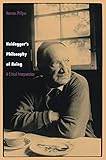Heidegger's Philosophy of Being : A Critical Interpretation / Herman Philipse.
Material type: TextPublisher: Princeton, NJ : Princeton University Press, [2021]Copyright date: ©1999Description: 1 online resource (576 p.)Content type:
TextPublisher: Princeton, NJ : Princeton University Press, [2021]Copyright date: ©1999Description: 1 online resource (576 p.)Content type: - 9781400822959
- Ontology
- PHILOSOPHY / Metaphysics
- Anaximander
- Aristotle
- Befindlichkeit
- Beiträge zur Philosophie
- Blochmann, Elisabeth
- Brogan, Walter
- Bultmann, Rudolf
- Carnap, Rudolf
- Cassirer, Ernst
- Chamberlain, Houston Stuart
- Ding an sich
- Entwurf
- Epicurus
- Fundamental Problems of Phenomenology
- Geworfenheit
- Grundstimmung
- Heraclitus
- Hume, David
- Janicaud, Dominique
- John the Baptist
- Kampf
- Kisiel, Theodore
- Leibniz, Gottfried Wilhelm
- Lutheranism
- Löwith, Karl
- Marxism
- Natorp essay
- Parmenides
- analytic philosophy
- authenticity
- axioms
- background practices
- deconstruction
- destiny
- dualism, Cartesian
- empiricism
- essentialism
- existentialia
- facticity
- faith
- foundationalism
- hermeneutical circle
- hermeneutics
- idealism
- inauthenticity
- individualism
- metaphysics
- mysticism
- objectivity
- pragmatism
- predication
- quietism
- B3279.H49
- online - DeGruyter
| Item type | Current library | Call number | URL | Status | Notes | Barcode | |
|---|---|---|---|---|---|---|---|
 eBook
eBook
|
Biblioteca "Angelicum" Pont. Univ. S.Tommaso d'Aquino Nuvola online | online - DeGruyter (Browse shelf(Opens below)) | Online access | Not for loan (Accesso limitato) | Accesso per gli utenti autorizzati / Access for authorized users | (dgr)9781400822959 |
Frontmatter -- CONTENTS -- PREFACE -- ACKNOWLEDGMENTS -- CHAPTER I Introduction -- CHAPTER II Analysis -- CHAPTER III Synthesis -- CHAPTER IV Critique -- CONCLUSION -- ABBREVIATIONS -- NOTES -- BIBLIOGRAPHY -- INDEX
restricted access online access with authorization star
http://purl.org/coar/access_right/c_16ec
This scrupulously researched and rigorously argued book is the first to interpret and evaluate the central topic of Martin Heidegger's philosophy--his celebrated "Question of Being"--in the context of the full range of Heidegger's thought. With this comprehensive approach, Herman Philipse distinguishes in unprecedented ways the center from the periphery, the essential from the incidental in Heidegger's philosophy. Among other achievements, this allows him to shed new light on the controversial relationship between Heidegger's life and thought--in particular the connections between his philosophy and his involvement with Nazism.Philipse begins by explaining which problems an interpretation of Heidegger's question of being should solve, and he specifies which type of interpretation is the best basis for an evaluation of Heidegger's thought. He then identifies various strands or leitmotifs in Heidegger's idea of being, and shows how these strands hang together in the philosopher's work. In doing so, Philipse offers new insights into Heidegger's views on such subjects as human existence, authenticity, logic, and language, and into his readings of such philosophers as Aristotle, Kant, Hegel, and Nietzsche. Philipse then integrates into his interpretation of Heidegger's overall theory the latest scholarship about the philosopher's engagement with Nazism. Finally, Philipse examines the fundamental structures of Heidegger's philosophy and assesses whether Heidegger's views are true, probable, or possess some other epistemic or existential value.As the most thorough interpretation of Heidegger's theory of being now available, this work represents a new phase in the vigorous debate about the philosopher's life and works.
Mode of access: Internet via World Wide Web.
In English.
Description based on online resource; title from PDF title page (publisher's Web site, viewed 07. Nov 2022)


